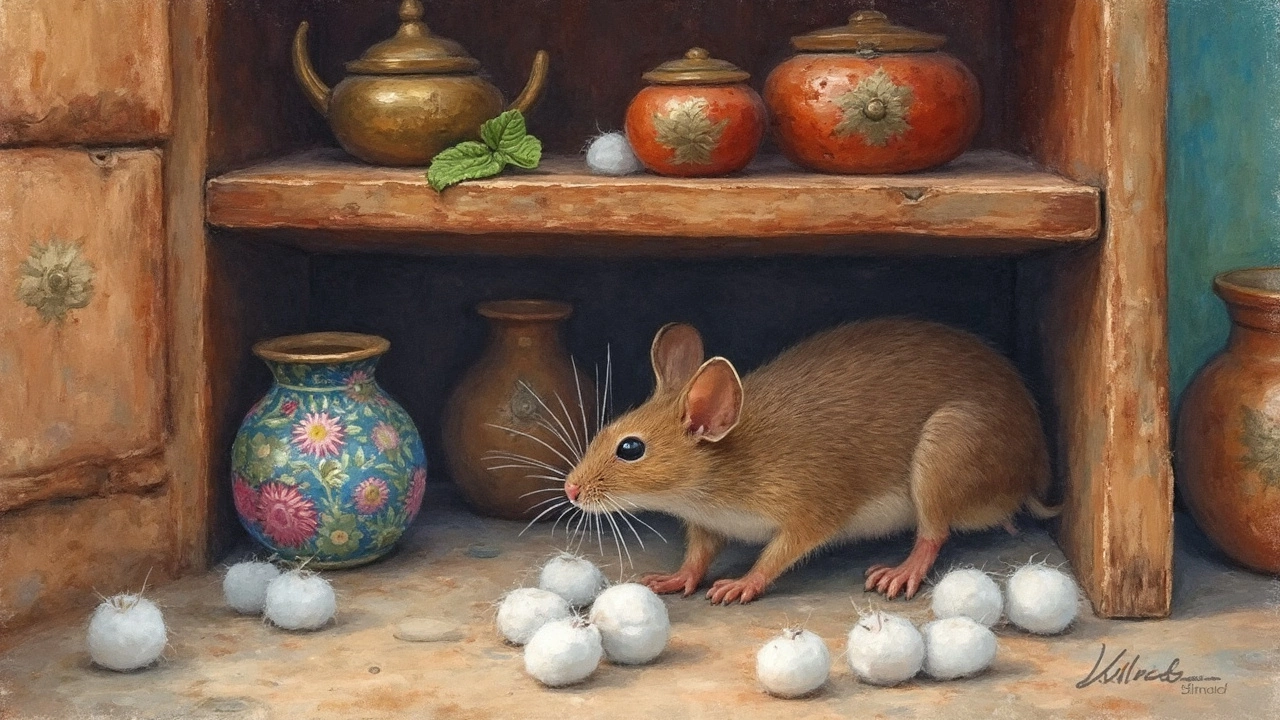Peppermint oil has a reputation as a mouse repellent, but does it really mess with mice that much? If you've ever had to deal with sneaky mice finding their way into your storage furniture, you know they're stubborn little creatures. Their sense of smell is off the charts, way better than ours, and that's where peppermint oil comes in. This stuff is strong—even a few drops will have your eyes watering.
Here’s the good news: mice really do hate that smell. It overwhelms their noses, and usually, they’ll look for somewhere a lot less minty. This makes peppermint oil a cheap and easy solution for anyone tired of finding droppings in their cabinet or storage bench. You don’t need any fancy gadgets, just a few cotton balls and a bottle of oil.
But don’t just start dumping oil everywhere. There’s actually a right way to use it on and around your storage furniture so it keeps mice away, and not just for a few days. Let’s see how you can make the most out of this simple trick and save yourself a lot of hassle in the long run.
- Mice and Their Super Senses
- Why Peppermint Oil Gets Rid of Mice
- Best Ways to Use Peppermint Oil in Storage Furniture
- What Actually Happens When Mice Smell It
- Pro Tips for Mouse-Proof Storage
Mice and Their Super Senses
Mice are like tiny detectives with supercharged noses. If you think your dog has a good sense of smell, mice take it even further. Their sense of smell is about ten times sharper than ours. This is a big reason why mice can track down food you forgot about, even if it's just some crumbs at the bottom of your storage furniture.
Here’s something wild: mice can sniff out food hidden behind walls or inside sealed containers. Their tiny noses even help them know where other mice have been, thanks to scent trails. This ultra sensitivity makes them experts at finding shelter or snacks in the most hidden parts of your house.
What really stands out with mice is how sensitive they are to strong odors. Natural scents, especially something as powerful as peppermint oil, hit them like a wall. For mice, walking into a strong smell isn’t just unpleasant—it's like setting off a stink bomb in a small room.
| Mouse Sense | Human Sense |
|---|---|
| Can smell food through packaging | Usually can't |
| Detects scent trails from a distance | Rarely notice |
| Gets overwhelmed by strong essential oils | Might just notice them |
That’s why a simple scent trick like peppermint oil can be a real game-changer for problems in your cabinets, storage ottomans, and closets. If you make that space unwelcoming to their super noses, they’ll usually just move on to somewhere else.
Why Peppermint Oil Gets Rid of Mice
So, why does peppermint oil bother mice so much? It comes down to the way these little guys experience the world. Mice depend on their sense of smell to find food and shelter. Their noses are way more sensitive than ours—scientists say they can smell stuff humans totally miss. When you use peppermint oil, you’re basically throwing up a huge red flag to a mouse’s nose.
The active ingredient in peppermint oil is menthol. That’s what gives peppermint its strong scent. Menthol overwhelms a mouse’s ability to sniff around for crumbs or nesting spots. It’s like they walk into a room with eyes stinging and can’t focus on anything else, so they just leave. With storage furniture, that means fewer droppings and gnawed corners.
There’s even research to back up the idea. Some tests showed that areas treated with peppermint oil saw less mouse activity compared to untreated spots. It’s not magic, but most mice will avoid spaces that smell as strong as a pack of gum exploded there.
Just splashing peppermint oil isn’t enough, though. The scent fades with time and doesn’t fill big spaces well. That’s why it works best for small, enclosed spots—like inside cabinets, chests, or other storage furniture. If you’re hoping to guard your storage from rodent repellent–worthy invaders, peppermint oil is a good first defense.
- Mice hate the smell—simple as that. It messes up their instincts.
- The scent of peppermint oil acts like a warning sign for them.
- It works better in small, closed-up spots where the strong smell can build up.
- You’ll want to refresh the scent every week or so for best results.
If you’re looking for an easy fix before going for traps or heavy-duty chemicals, a little peppermint oil might do the trick. It’s budget-friendly, safe for most homes, and way less of a headache than dealing with stubborn rodents chewing up your stuff.

Best Ways to Use Peppermint Oil in Storage Furniture
Using peppermint oil in your storage furniture isn’t just about pouring a few drops and hoping for the best. A couple of popular methods actually work way better and make sure the smell sticks around long enough to keep mice and other critters out.
The most reliable trick? Cotton balls. Here’s how most folks do it:
- Grab some good-quality cotton balls, since cheaper ones just dry out fast.
- Add about 10-12 drops of peppermint oil to each ball—don’t skimp, mice have tough noses.
- Put the scented cotton balls in corners, behind storage bins, and tucked inside drawers or anywhere a mouse might squeeze through.
Don’t stop at one round, though. The scent fades after a week or so, especially if it’s hot or if your storage area gets a lot of air moving through. Make it a habit to refresh those cotton balls every 7-10 days. If you find droppings or notice the smell gone, switch them out sooner.
Some people like to put the oil directly onto furniture, but it can stain wood or paint. If you’ve got a fancy cabinet, stick to containers or sachets instead. Old sock bits, little cloth bags, or empty tea bags work great to hold cotton balls so oil doesn’t leak onto surfaces.
If you've got a lot of storage furniture in a garage or shed, try sealing up any gaps first. Even the best rodent repellent can’t cover for a big hole where mice zip in and out. Seal cracks and tuck the oil-soaked cotton balls near those trouble spots.
Here’s a quick table with how long peppermint scent usually lasts in different storage situations:
| Storage Area | How Long Scent Lasts |
|---|---|
| Closed cabinets/closet | About 10 days |
| Open shelves | 5-7 days |
| Garage or shed | 3-6 days (more airflow) |
Pair the oil trick with basic cleaning—mice hate a clutter-free and crumb-free zone. No food, less interest. A clean, minty-fresh storage unit is the kind that sends rodents packing.
What Actually Happens When Mice Smell It
So, what really goes on when a mouse takes a whiff of peppermint oil? This isn’t just some old wives’ tale—there are actual studies (like the one from 2017 in the Journal of Pest Science) showing that rodents avoid places that reek of strong minty smells. Mice have about 1,000 different types of smell receptors in their noses. That’s way more than people. When that peppermint aroma hits, it sort of overloads their sensory system. It’s like standing next to someone who sprayed a whole can of extra-strength deodorant right in your face. It’s overwhelming enough that most mice just bail.
Here’s what usually happens, step-by-step:
- Mice approach your storage furniture as usual, hunting for food or shelter.
- They sniff the area and hit that blast of peppermint oil.
- Instead of getting curious, they instantly stop in their tracks because the scent is too much to handle.
- Many will about-face and look for an easier place to hide or snack.
- If the smell fades (it does after a week or two), some brave or especially hungry mice might come back, but they’ll never get used to it.
If you’re curious about how effective this really is, check out the numbers below. While peppermint oil doesn’t kill or trap mice, research shows it can drop rodent activity by a notable amount when used properly.
| Peppermint Oil Use | Average Reduction in Mouse Activity |
|---|---|
| Weekly Reapplication | 65% |
| Monthly Reapplication | 30% |
| No Use | 0% |
Mice are stubborn, but peppermint oil is usually enough to send them packing—at least when the smell stays strong. It’s not magic, but for anyone tired of mouse-proofing their storage furniture with traps, this trick can make life easier and a lot less gross.

Pro Tips for Mouse-Proof Storage
Don’t just trust that a whiff of peppermint oil will fix a mouse problem by itself. You need a smart game plan for your storage furniture to keep those little troublemakers out long-term. Here are clear steps that actually make a difference:
- Seal all gaps and cracks. Mice can squeeze through holes smaller than a dime. Check the backs, bottoms, and corners of your storage pieces, especially if they sit against a wall. Use steel wool and strong caulk—mice can chew through foam and rubber, but not steel wool.
- Keep it clean. Crumbs attract mice. Wipe down your storage chests, cabinets, and benches. Don’t use open storage for things like pet food, snacks, or bird seed. Airtight containers help a lot.
- Refresh peppermint oil regularly. The smell weakens after a week or two. Set a reminder on your phone so you don’t forget to re-soak your cotton balls every 10-14 days. Place them in corners, drawer backs, or under lids where the scent lingers longest.
- Lift and check furniture often. Mice hide under and behind heavy stuff. Move storage furniture every now and then to break up nesting spots—if it’s dusty or you see droppings, clean and reapply oil right away.
- Use peppermint oil as a boost to other methods. Mix and match with traps or ultrasonic repellents for tough cases. If mice are persistent, peppermint oil alone probably won’t get rid of them all.
Want a quick look at what actually works? Here’s a handy rundown:
| Tip | Effectiveness |
|---|---|
| Peppermint oil (used alone) | Moderate – Repels, but doesn’t eliminate |
| Sealing entry points | High – Stops new mice from entering |
| Airtight containers | High – Removes food temptations |
| Regular cleaning | High – Lessens attraction |
| Combining repellents & traps | High – Most effective for infestations |
Putting these tips to work will save your storage furniture and keep mice from making your stuff their new home. Combining multiple simple tricks beats relying on just one solution every time.

